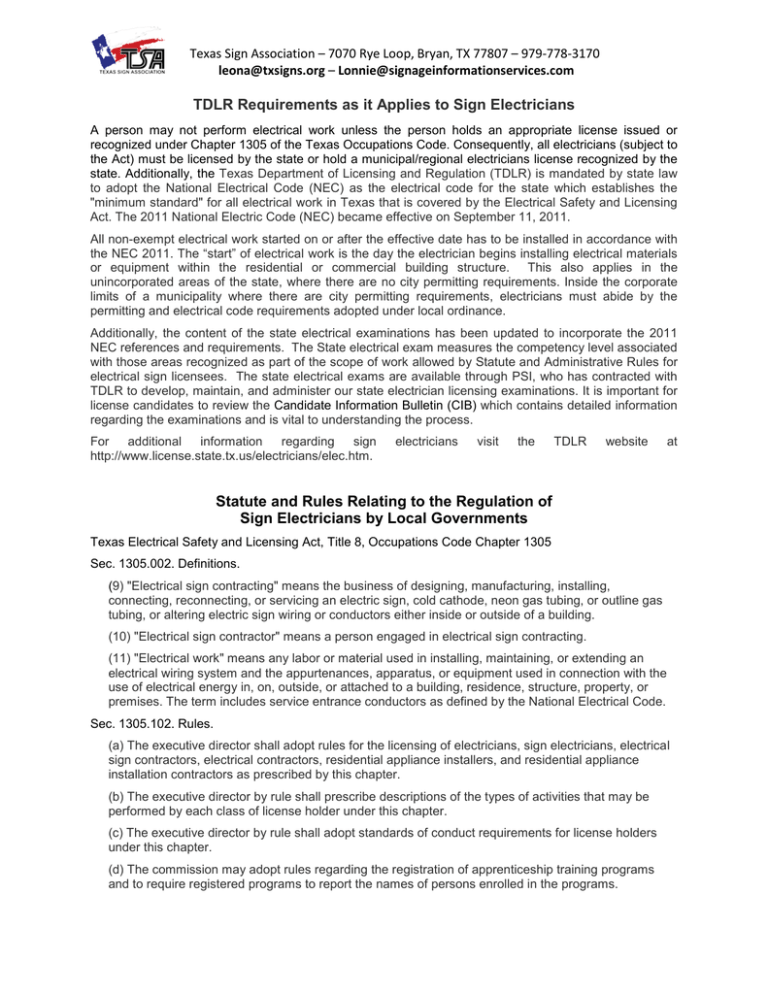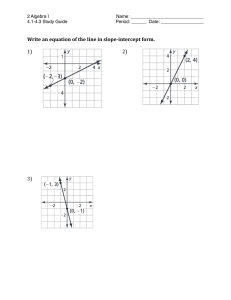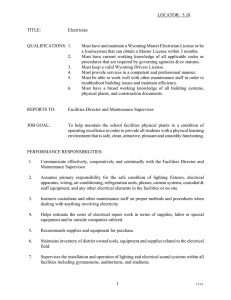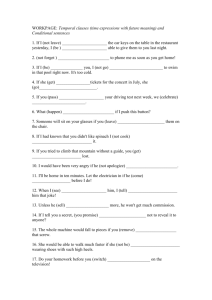TDLR Requirements as it Applies to Sign Electricians
advertisement

Texas Sign Association – 7070 Rye Loop, Bryan, TX 77807 – 979-778-3170 leona@txsigns.org – Lonnie@signageinformationservices.com TDLR Requirements as it Applies to Sign Electricians A person may not perform electrical work unless the person holds an appropriate license issued or recognized under Chapter 1305 of the Texas Occupations Code. Consequently, all electricians (subject to the Act) must be licensed by the state or hold a municipal/regional electricians license recognized by the state. Additionally, the Texas Department of Licensing and Regulation (TDLR) is mandated by state law to adopt the National Electrical Code (NEC) as the electrical code for the state which establishes the "minimum standard" for all electrical work in Texas that is covered by the Electrical Safety and Licensing Act. The 2011 National Electric Code (NEC) became effective on September 11, 2011. All non-exempt electrical work started on or after the effective date has to be installed in accordance with the NEC 2011. The “start” of electrical work is the day the electrician begins installing electrical materials or equipment within the residential or commercial building structure. This also applies in the unincorporated areas of the state, where there are no city permitting requirements. Inside the corporate limits of a municipality where there are city permitting requirements, electricians must abide by the permitting and electrical code requirements adopted under local ordinance. Additionally, the content of the state electrical examinations has been updated to incorporate the 2011 NEC references and requirements. The State electrical exam measures the competency level associated with those areas recognized as part of the scope of work allowed by Statute and Administrative Rules for electrical sign licensees. The state electrical exams are available through PSI, who has contracted with TDLR to develop, maintain, and administer our state electrician licensing examinations. It is important for license candidates to review the Candidate Information Bulletin (CIB) which contains detailed information regarding the examinations and is vital to understanding the process. For additional information regarding sign http://www.license.state.tx.us/electricians/elec.htm. electricians visit the TDLR website at Statute and Rules Relating to the Regulation of Sign Electricians by Local Governments Texas Electrical Safety and Licensing Act, Title 8, Occupations Code Chapter 1305 Sec. 1305.002. Definitions. (9) "Electrical sign contracting" means the business of designing, manufacturing, installing, connecting, reconnecting, or servicing an electric sign, cold cathode, neon gas tubing, or outline gas tubing, or altering electric sign wiring or conductors either inside or outside of a building. (10) "Electrical sign contractor" means a person engaged in electrical sign contracting. (11) "Electrical work" means any labor or material used in installing, maintaining, or extending an electrical wiring system and the appurtenances, apparatus, or equipment used in connection with the use of electrical energy in, on, outside, or attached to a building, residence, structure, property, or premises. The term includes service entrance conductors as defined by the National Electrical Code. Sec. 1305.102. Rules. (a) The executive director shall adopt rules for the licensing of electricians, sign electricians, electrical sign contractors, electrical contractors, residential appliance installers, and residential appliance installation contractors as prescribed by this chapter. (b) The executive director by rule shall prescribe descriptions of the types of activities that may be performed by each class of license holder under this chapter. (c) The executive director by rule shall adopt standards of conduct requirements for license holders under this chapter. (d) The commission may adopt rules regarding the registration of apprenticeship training programs and to require registered programs to report the names of persons enrolled in the programs. Texas Sign Association – 7070 Rye Loop, Bryan, TX 77807 – 979-778-3170 leona@txsigns.org – Lonnie@signageinformationservices.com Sec. 1305.151. License Required. Except as provided by Section 1305.003, a person or business may not perform or offer to perform electrical work or residential appliance installation unless the person or business holds an appropriate license issued or recognized under this chapter. Sec. 1305.162. Examinations. (a) Examinations required by this subchapter shall be conducted throughout the state. (b) The department shall accept, develop, or contract for the examinations required by this chapter, including the administration of the examinations. Each examination must test the knowledge of the applicant about materials and methods used in electrical installations related to the activities that may be performed within each class of license under this chapter and the standards prescribed by the National Electrical Code as adopted by the executive director. (c) The executive director shall determine uniform standards for acceptable performance on an examination. Sec. 1305.201. Municipal or Regional Regulation. (a) This chapter does not prohibit a municipality or region from regulating electricians or residential appliance installers by: (1) enacting an ordinance requiring inspections; (2) offering examinations; (3) issuing municipal or regional licenses; or (4) collecting permit fees for municipal or regional licenses and examinations from electricians and appliance installers for work performed in the municipality or region. (b) A municipality or region may not require a person to take a municipal or regional examination if that person holds the appropriate license issued under this chapter and is working within the scope of that license. (c) A municipality may adopt procedures for the: (1) adoption of local amendments to the National Electrical Code; and (2) administration and enforcement of that code. (d) Electrical work performed within the corporate limits of a municipality must be installed in accordance with all applicable local ordinances. (e) Electrical work performed in an unincorporated area of the state must be installed in accordance with standards at least as stringent as the requirements of the state electrical code as adopted under Section 1305.101. Sec. 1305.202. Scope of Municipal or Regional License. (a) A license to perform electrical work issued by a municipality or region is valid only in the municipality or region or in another municipality or region under a reciprocal agreement. (b) A person who holds a license to perform electrical work or electrical sign work issued by a municipality or region that elects to discontinue issuing or renewing licenses may apply for an equivalent license under this chapter without complying with the applicable examination requirement if the person: (1) held the municipal or regional license for the preceding year; and (2) submits an application for a license under this chapter within 90 days of the date the municipality or region stops issuing or renewing licenses. Texas Sign Association – 7070 Rye Loop, Bryan, TX 77807 – 979-778-3170 leona@txsigns.org – Lonnie@signageinformationservices.com Administrative Rules of the Texas Department of Licensing and Regulation 16 Texas Administrative Code, Chapter 73 73.10. Definitions. (12) Electrical Sign Contractor--A person, or entity, licensed as an electrical sign contractor, that is in the business of performing "Electrical Sign Contracting" as defined by Texas Occupations Code, §1305.002(9). (13) Master Sign Electrician--An individual, licensed as a master sign electrician, who, on behalf of an electrical sign contractor, performs "Electrical Sign Work" as defined in paragraph (18). (14) Journeyman Sign Electrician--An individual, licensed as a journeyman sign electrician, who works under the general supervision of a master electrician or a master sign electrician, on behalf of an electrical sign contractor, while performing “Electrical Sign Work” as defined in paragraph (18). (18) Electrical Sign Work--Any labor or material used in manufacturing, installing, maintaining, extending, connecting or reconnecting an electrical wiring system and its appurtenances, apparatus or equipment used in connection with signs, outline lighting, awnings, signals, light emitting diodes, and the repair of existing outdoor electric discharge lighting, including parking lot pole lighting. This also includes the installation of an electrical service integral to an isolated sign and/or outline lighting installation. (20) Electrical Sign Apprentice--An individual, licensed as an electrical sign apprentice who works under the on-site supervision of a master electrician, a master sign electrician, or a journeyman sign electrician, on behalf of an electrical sign contractor performing "Electrical Sign Work” as defined by this chapter. (25) Offer to perform--To make a written or oral proposal, to contract in writing or orally to perform electrical work or electrical sign work, to advertise in any form through any medium that a person or business entity is an electrical contractor, electrical sign contractor, or residential appliance installation contractor or that implies in any way that a person or business entity is available to contract for or perform electrical work, electrical sign work, or residential appliance installation work. 73.52. Electrical Sign Contractors’ Responsibilities. (a) An Electrical Sign Contractor shall: (1) notify the department when a new master electrician or master sign electrician of record is assigned to the contractor and notify the department within thirty business days from the date that the master electrician's employment with the contractor ended; (2) maintain employee records and records of all work performed on its behalf for a period of four years after completion of the work, and shall make those records available to the department at the contractor’s place of business during normal business hours for inspection and copying. If the contractor’s principal place of business is located out of the state of Texas, the department may require the contractor to make records available to the department at its offices in Austin, Texas or another location agreed upon by the department and the contractor. (b) A person or contractor that performs or offers to perform electrical sign contracting shall: (1) provide safe and proper installation and service, and assure the electro-mechanical integrity of all work and installations are to code; (2) not misrepresent the need for services, services to be provided, or services that have been provided; (3) not make a fraudulent promise or false statement to influence, persuade, or induce an individual or an entity to contract for services; and (4) ensure that all of an electrical sign contractor’s non-exempt electrical work shall be performed by licensed individuals. Texas Sign Association – 7070 Rye Loop, Bryan, TX 77807 – 979-778-3170 leona@txsigns.org – Lonnie@signageinformationservices.com (c) The design of an electrical sign shall only be done by a licensed master electrician, master sign electrician, or design professional as authorized by statute. The design shall not be subcontracted to an unlicensed person, firm or corporation. (d) A licensed electrical sign contractor shall display its name and license number on both sides of each vehicle owned or operated by the business and used in the conduct of electrical work. Lettering shall be of a contrasting color and at least two inches in height. The license number shall be preceded by the letters “TSCL”. (e) All advertising by electrical sign contracting companies designed to solicit electrical business shall include the electrical sign contractor’s name and license number. This includes business cards. The following advertising does not require the license number: (1) nationally placed television advertising, in which a statement indicating that license numbers are available upon request is used in lieu of the electrical sign contractor license number; (2) telephone book listings that contain only the name, address, and telephone number; (3) manufacturers’ and distributor’s telephone book trade ads identifying an electrical contractor; (4) telephone solicitations, provided the solicitor states that the contractor complies with licensing requirements of the state. The electrical sign contractor’s number must be provided upon request; (5) promotional items of nominal value such as ball caps, tee shirts, and other gifts; and (6) signs located on the contractor’s permanent business location. (f) The electrical sign contractor’s name, address, phone number, and license number shall appear on all proposals, invoices, and written contracts from the contractor. The following information: “Regulated by The Texas Department of Licensing and Regulation, P. O. Box 12157, Austin, Texas 78711, 1-800803-9202, 512-463-6599; website: www.license.state.tx.us/complaints” shall be listed on all proposals, invoices, and written contracts. (g) A licensed electrical sign contractor and its designated master electrician or master sign electrician of record is responsible for supervision of all licensees performing work on behalf of the contractor to assure compliance with applicable statutes and rules and in particular, standards of conduct set out in this chapter. (h) An electrical sign contractor shall not use a license that is not assigned to that contractor. 73.53. Responsibilities of All Persons Performing Electrical Work. (Effective January 1, 2010, 34 TexReg 9433; amended effective March 15, 2012, 37 TexReg 1703) All persons must perform non-exempt electrical work, non-exempt electrical sign work, or non-exempt residential appliance installation work in compliance with applicable codes and ordinances. The department will interpret applicable codes and ordinances for purposes of enforcement of the Act. Frequently Asked Questions Relating to Electricians within Local Governments 1. Who must be licensed? Anyone who performs electrical work in the state of Texas must be licensed. Electrical work is defined as: • Any labor or material used in installing, maintaining or extending an electrical wiring system and the appurtenances, apparatus or equipment used in connection with the use of electrical energy in, on, outside, or attached to a building, residence, structure, property, or premises; • Service entrance conductors, as defined by the National Electrical Code; • Electrical contractors, electrical sign contractors, and residential appliance installer contractors. Texas Sign Association – 7070 Rye Loop, Bryan, TX 77807 – 979-778-3170 leona@txsigns.org – Lonnie@signageinformationservices.com 2. What are the different types of licenses? There are licenses for Business and Individuals: Business Licenses • Electrical Contractor • Electrical Sign Contractor • Residential Appliance Installation Contractor Individual Licenses • Master Electrician • Master Sign Electrician • Journeyman Electrician • Journeyman Sign Electrician • Residential Wireman • Maintenance Electrician • Residential Appliance Installer • Electrical Apprentice • Electrical Sign Apprentice 3. What are the requirements for a license? You must submit an application, any required supporting documentation, and pay the required fees for each type of license you need. In addition, you must meet the following requirements: Business Licenses • Electrical Contractor - You must be a licensed master electrician, or employ a licensed master electrician; - Maintain the required limits of business liability insurance: (1) Minimum $300,000 per occurrence (combined for property damage and bodily injury); (2) Minimum $600,000 aggregate (total amount the policy will pay for property damage and bodily injury coverage); and (3) Minimum $300,000 aggregate for products and completed operations. - Meet the statutory requirements for workers compensation coverage. • Electrical Sign Contractor - You must be a licensed master electrician or master sign electrician, or employ a licensed master electrician or master sign electrician; - Maintain the required limits of business liability insurance: (1) Minimum $300,000 per occurrence (combined for property damage and bodily injury); (2) Minimum $600,000 aggregate (total amount the policy will pay for property damage and bodily injury coverage); and (3) Minimum $300,000 aggregate for products and completed operations. - Meet the statutory requirements for workers compensation coverage. • Residential Appliance Installation Contractor - You must be a licensed residential appliance installer, or employ a licensed residential appliance installer; - Maintain the required limits of business liability insurance: (1) Minimum $300,000 per occurrence (combined for property damage and bodily injury); (2) Minimum $600,000 aggregate (total amount the policy will pay for property damage and bodily injury coverage); and (3) Minimum $300,000 aggregate for products and completed operations. - Meet the statutory requirements for workers compensation coverage. Individual Licenses • Master Electrician Texas Sign Association – 7070 Rye Loop, Bryan, TX 77807 – 979-778-3170 leona@txsigns.org – Lonnie@signageinformationservices.com - 12,000 hours of on-the-job training under the supervision of a master electrician; - Hold a journeyman electrician license for at least two years; - Passing score on the master electrician examination. • Master Sign Electrician - 12,000 hours of on-the-job training under the supervision of a master or master sign electrician; - Passing score on the master sign electrician examination. • Journeyman Electrician - 8,000 hours of on-the-job training under the supervision of a master electrician; - Passing score on the journeyman electrician examination. • Journeyman Sign Electrician - 8,000 hours of on-the-job training under the supervision of a master or master sign electrician; - Passing score on the journeyman sign electrician examination. • Residential Wireman - 4,000 hours of on-the-job training under the supervision of a master electrician or residential wireman; - Passing score on the residential wireman examination. • Maintenance Electrician - 8,000 hours of on-the-job training under the supervision of a master electrician or a maintenance electrician; - Passing score on the maintenance electrician examination. • Residential Appliance Installer - Be at least 16 years old; - Pass the residential appliance installer examination. • Electrical Apprentice - Be at least 16 years old; - Assisting in the installation of electrical work under the supervision of a master electrician. • Electrical Sign Apprentice - Be at least 18 years old; - Assisting in the installation of electrical work under the supervision of a master electrician. 4. Where will a state license allow me to work? A state license is valid anywhere in Texas. 5. Can a city or region still require me to have a city license and charge me a fee? Yes. However, they may not require you to take a municipal or regional examination if you hold a state electrical license. 6. I have a municipal electrician’s license. Can I perform electrical work in Texas? Yes, but you can only perform electrical work within the city where you are licensed. A municipal license is not valid statewide. 7. I work as an electrician in agricultural operations only, such as farming and ranching. Do I need a statewide electrician’s license? No, a state electrician’s license is not required for electrical work performed on a building, structure, or equipment used in agriculture. For more on exemptions, see the “Exemptions” section below. 73.53. Responsibilities of All Persons Performing Electrical Work. (Effective January 1, 2010, 34 TexReg 9433; amended effective March 15, 2012, 37 TexReg 1703) All persons must perform non-exempt electrical work, non-exempt electrical sign work, or non-exempt residential appliance installation work in compliance with applicable codes and ordinances. The department will interpret applicable codes and ordinances for purposes of enforcement of the Act.



